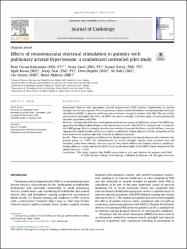Effects of neuromuscular electrical stimulation in patients with pulmonary arterial hypertension: a randomized controlled pilot study

Göster/
Erişim
info:eu-repo/semantics/openAccessTarih
2020Yazar
Kahraman, Buse ÖzcanSavcı, Sema
Özsoy, İsmail
Baran, Agah
Acar, Serap
Özpelit, Ebru
Balcı, Ali
Sevinç, Can
Akdeniz, Bahri
Üst veri
Tüm öğe kaydını gösterKünye
Kahraman, B. O., Savci, S., Ozsoy, I., Baran, A., Acar, S., Ozpelit, E., ... & Akdeniz, B. (2020). Effects of neuromuscular electrical stimulation in patients with pulmonary arterial hypertension: a randomized controlled pilot study. Journal of Cardiology, 75(6), 702-708.Özet
Background: Patients with pulmonary arterial hypertension (PAH) present impairments in muscle strength and exercise capacity. There is growing evidence about the benefits of neuromuscular electrical stimulation (NMES) in patients with respiratory diseases, except in patients with PAH. The aim of this study was to investigate the effects of NMES on muscle strength, and other physical and psychosocial variables in patients with PAH.
Methods: Patients with PAH were randomly divided into two groups as NMES and control. The NMES was applied to the bilateral deltoid and quadriceps femoris muscles with 50 Hz for 3 days/week, 8 weeks for the NMES group. Muscle strength, muscle cross-sectional area and thickness, arterial stiffness, exercise capacity, functional mobility and balance, balance confidence, fatigue, physical activity, and quality of life were assessed at baseline and after 8 weeks by blinded assessors. Results: There was no significant difference in the demographic and clinical characteristics between the patient groups (p > 0.05). The improvements in muscle strength, muscle cross-sectional area and thickness, pulse wave velocity, exercise capacity, functional mobility and balance, balance confidence, fatigue, physical activity, and quality of life were significantly higher in the NMES group compared to the control group (p < 0.05). Conclusions: This study suggests that NMES intervention is safe and effective for patients with PAH. (C) 2020 Japanese College of Cardiology. Published by Elsevier Ltd. All rights reserved.

















